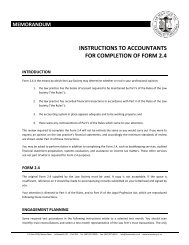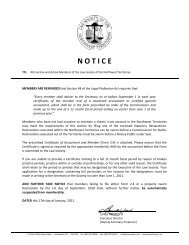ARCTIC OBITER
March/April 2013 - Law Society of the Northwest Territories
March/April 2013 - Law Society of the Northwest Territories
- No tags were found...
You also want an ePaper? Increase the reach of your titles
YUMPU automatically turns print PDFs into web optimized ePapers that Google loves.
GOVERNANCE<br />
MANDATORY CPD: DOES IT WORK?<br />
A recent article by Jordan Furlong, author of the<br />
Law21 law blog and frequent contributor to the Arctic<br />
Obiter, has stirred the waters on mandatory CPD<br />
requirements. The unambiguous article, titled “The<br />
MCLE question no one wants to ask”, questions the<br />
ability of law societies to effectively measure<br />
competency in lawyers, and asks, quite frankly: Does<br />
it work?<br />
To answer this, we must first look beyond this<br />
profession. Mandatory CPD is not new. The majority<br />
of recognized self-regulating professions in Canada<br />
and around the world have had competency<br />
requirements for decades. Doctors, nurses,<br />
accountants, engineers and architects abide by similar<br />
requirements as those by lawyers.<br />
Or vice versa,<br />
rather, since it is the legal profession that is seemingly<br />
catching up. In these professions, it is almost a given<br />
that constant testing, education and reeducation will<br />
have a direct impact on the people being served. After<br />
all, as medicine changes, so too does treatment; and as<br />
building codes change, so too do the architectural<br />
drawings.<br />
Ben Russo<br />
Legal Education Coordinator<br />
Law Society of the Northwest Territories<br />
Yellowknife<br />
Law is not biology, medicine, physics or math, but it<br />
does adhere to its own science, sharing the same<br />
principles of change and adaptation. As the criminal<br />
code changes, so too does the defence lawyer’s case.<br />
Similar to other professions, to be a candidate for a<br />
legal professional, competency standards in law must<br />
be met at multiple gateways before and after<br />
graduation. However, unlike other professions, and<br />
before CPD programs came into play, a call to the Bar<br />
marked the end of competency tests.<br />
If law is always changing, evolving and adapting to<br />
the times, it’s not too precarious to presume lawyers<br />
may become outdated and incompetent.<br />
As regulators, we work closely with law schools to<br />
develop degree programs befitting the necessities of<br />
Canadian law and the requirements of the Canadian<br />
public. We require qualified post-graduates to<br />
undergo apprenticeships under the direct supervision<br />
of experienced lawyers, as well as succeed in<br />
institutionally prescribed programs to ensure specific<br />
standards of competence are achieved. If that’s not<br />
enough, we may also require the applicant to<br />
successfully complete extensive exams to prove,<br />
absolutely, that they are prepared to provide<br />
professional services to the public.<br />
Prior to mandatory CPD, once these hurdles were<br />
overcome by the now-member, we stopped checking.<br />
Yes, we proactively checked with spot audits and peer<br />
reviews on occasion and, when discipline matters<br />
arose, we analyzed a member’s practice and made<br />
18 ■ MARCH/APRIL 2013 <strong>ARCTIC</strong> <strong>OBITER</strong>
















